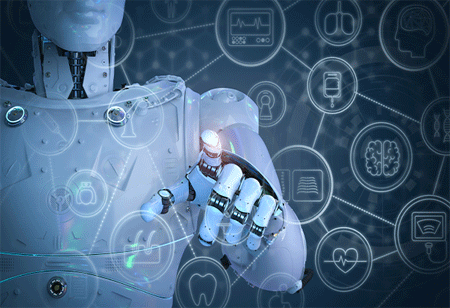Hima P M, Assistant Editor

AI applications had made huge leap in medicine including drug discovery and personalized treatment options. By the proper integration of AI technology in personalized data collection and analysis, experts are expecting to find a quicker way to diagnose symptoms and find prevent various genetic and neurological diseases. Medical institutes have started widely implementing bots to attend to patient queries and support them 24 hours on scheduling appointments, answering queries related to prescriptions , drug availability, cost effectiveness and alternative cost effective drugs.
How Far AI has Disrupted the Medical System Currently
The latest smart watch in our hands is one of the major examples of how connected our health monitoring system has been with AI. The most commonly used AI application are health and fitness monitors, this has become widely popular and people use apps to track and analyse details about their health and are able to share real-time data with doctors.
The current applications of AI in medical systems include, analysing and matching patient symptoms to appropriate physician, patient diagnosis, patient prognosis, drug discovery, bot assistants, transcribe notes, and organizing images and files. The latest widely used application of AI was to find hotspots and limit the spread of disease during the Covid period. The images like X-rays, CT scans and MRIs can be diagnosed easily by AI.
A research team at University of Hawaii found that deploying deep learning AI technologies can help to diagnose medical conditions such as breast cancer at the earliest. AI could be used to identify errors in dosage or how patient administers medications. For eg: 70 percent of patients don’t take insulin as prescribed, AI tools can help to reduce the risk of medicine intake in wrong quantity.
Analysing the AI Related Myths
There is a common myth that AI will replace the doctors or physicians completely. Even though the future is unpredictable we could tell without any doubt that AI cannot replace a human doctor. A doctor or physician is a job that requires empathy and understanding towards the patients. More over a small mistake can cost a life in the field of medicine. It is unlikely that humans will be completely replaced by AI in the medical field, the aspects of care, compassion, empathy, critical thinking and complex decision making are invaluable while treating a patient.
In some fields like radiology, pathology and dermatology AI has proved to match or exceed humans in its diagnostic ability. There are reports that physician-machine collaborations will outperform either one alone. But an MIT group developed an ML algorithm to determine when a human expert is needed. They identified that X-rays, scans etc could be understood more easily by a human-AI hybrid. However, another published study found that skin cancer was recognised by AI better than experienced doctors. Researchers from US, German and French gathered together studying more than 100,000 images to identify skin cancer, they compared AI results with the findings of 58 international dermatologists o find that AI did better.
AI could effectively prevent physician burnouts by eliminating repetitive tasks and administrative works thereby helping the to concentrate on patient care. However, AI might result in reducing clinical workforce. AI physician collaboration will increase the reliability on diagonosis and medication.
Fraud Prevention
Healthcare industry is one of industries prone to fraud. The industry has a reported fraudulence of about $380 billion/year in the name of cost of consumers’ medical premiums and out-of-pocket expenses. AI can be used to recognise unusual or suspicious patterns in insuance claims. Itcould prevent fake billing of equipment as well as performing unnecessary tests to take advantage of insurance payments. Traditional methods of fraud detection are manual, time consuming and prone to errors, extensieve sets of data have to be reviewed and analysed manually which will make it inefficient and also provide loop holes for large number of fraudulent activities.
About 60 percent of Indian insurance companies are seeing a rapid increase in insurance fraud, especially in the life and health insurance space, according to Deloitte’s Insurance Fraud Survey 2023. According to a recent survey, number of false claims in the healthcare industry in India is 15 percent of the total claims. Indian healthcare industry is losing approximately Rs. 600-Rs. 800 crores on fraudulent claims recently. The Federal Bureau of Investigation (FBI) estimates that fraud accounts for up to 10 percent of all billings within the United States (U.S.) . The industry is facing fraudulent globally and with the help of AI , data integration and ML, healthcare industry will be able to prevent all fraudulent.
Using advanced embeddings, we could monitor anomalies in billing patterns, unusual treatment procedures, and inconsistencies in patient information. By examining historical data and comparing it to real-time information, the system will be able to ensure detection of irregularities in claims, thus preventing frauds.
So, physicians and AI going hand in hand will be the future scenario of healthcare industry, making medical procedures easier and less fraudulent.